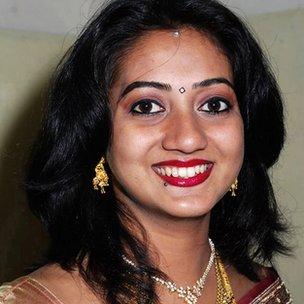Woman dies after abortion request 'refused' at Galway hospital
- Published

Savita Halappanavar's family said she asked several times for an abortion before she died. Photograph courtesy of the Irish Times
The husband of a pregnant woman who died in an Irish hospital has said he has no doubt she would be alive if she had been allowed an abortion.
Savita Halappanavar's family said she asked several times for her pregnancy to be terminated because she had severe back pain and was miscarrying.
Her husband told the BBC that it was refused because there was a foetal heartbeat.
Ms Halappanavar's death, on 28 October, is the subject of two investigations.
An autopsy carried out two days after her death found she had died from septicaemia, according to the Irish Times.
Ms Halappanavar, who was 31 and originally from India, was a dentist.
Praveen Halappanavar said staff at University Hospital Galway told them Ireland was "a Catholic country".
Savita Halappanavar's husband says he believes she would be alive if she had been allowed an abortion
When asked by the BBC if he thought his wife would still be alive if the termination had been allowed, Mr Halappanavar said: "Of course, no doubt about it."
He said Savita had been "on top of the world" before experiencing difficulties.
"It was her first baby, first pregnancy and you know she was on top of the world basically," he said.
"She was so happy and everything was going well, she was so excited.
"On the Saturday night everything changed, she started experiencing back pain so we called into the hospital, the university hospital."
He said she continued to experience pain and asked a consultant if she could be induced.
"They said unfortunately she can't because it's a Catholic country," Mr Halappanavar said.
"Savita said to her she is not Catholic, she is Hindu, and why impose the law on her.
"But she said 'I'm sorry, unfortunately it's a Catholic country' and it's the law that they can't abort when the foetus is live."
The baby's heartbeat stopped on the Wednesday.
"I got a call at about half twelve on the Wednesday night that Savita's heart rate had really gone up and that they had moved her to ICU," Mr Halappanavar said.
"Things just kept on getting worse and on Friday they told me that she was critically ill."
He said some of Savita's organs stopped functioning and she died on Sunday 28 October.
Substantial risk
University Hospital Galway is to carry out an internal investigation. It said it could not comment on individual cases but would be cooperating fully with the coroner's inquest into Ms Halappanavar's death.
In a statement released on Wednesday, the Galway Roscommon University Hospitals Group extended its sympathy to the husband, family and friends of Ms Halappanavar.
It said it was standard practice to review unexpected deaths in line with the Irish Health Service Executive, external's (HSE) National Incident Management Policy.
"Galway Roscommon University Hospitals Group wishes to emphasise that the facts of this tragic case have yet to be established; that is the purpose of the review," the statement said.
The HSE has launched a separate investigation.
Asked if the Irish government would carry out an external inquiry into the death, Taoiseach (Prime Minister) Enda Kenny said: "It would be very appropriate that we don't rule anything out here, but there are two reports and investigations going on at the moment."
The group Precious Life, which campaigns against abortion, said its thoughts and prayers were with Ms Halappanavar's family.
In a statement, it said it hoped the investigations would "shed full light" on what had happened.
"Ireland's laws protecting unborn babies do not pose a threat to women's lives, according to the obstetricians and gynaecologists who care for women every day," they said.
Taoiseach Enda Kenny said he was not ruling out an independent inquiry
Dr Muiris Houston, health analyst for The Irish Times, said that all of the circumstances surrounding the incident had not been revealed yet.
He described it as a "rare situation".
"It is deeply shocking, but I think as responsible people we have to remember that you do need to hear all sides of the story before you make any definitive comment," he said.
"I do believe we need to do that in this case."
About 2,000 protesters assembled outside the Irish parliament in Dublin on Wednesday evening to call for the Irish government to urgently reform the Republic's abortion laws.
A minute's silence was held in memory of Mrs Halappanavar.
A group of about 40 protesters also gathered outside the Irish embassy in London.
In Cork, a candlelight vigil was held at the city's opera house in memory of the dentist.
Abortion is illegal in the Republic except where there is a real and substantial risk to the life, as distinct from the health, of the mother.
The Irish government in January established a 14-member expert group to make recommendations based on a 2010 European Court of Human Rights judgment that the state failed to implement existing rights to lawful abortion where a mother's life was at risk.
A spokesperson for the Department of Health said that the group was due to report back to the Minister for Health, James Reilly, shortly.
"The minister will consider the group's report and subsequently submit it to government," the spokesperson said.
Mr Halappanavar is still in India after accompanying his wife's body there for her funeral.
- Published14 November 2012
- Published16 December 2010
- Published16 December 2010